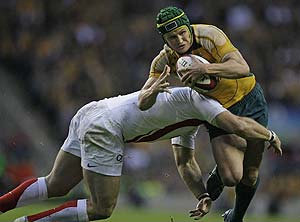
Matt Giteau of Australia, right, is tackled during the rugby union international match between England and Australia at Twickenham stadium, London, England, Saturday Nov. 15, 2008. AP Photo/Matt Dunham
A New Zealand astrologer, Don Murray, has made headlines around the world with his sports predictions for 2010. To my mind, whatever merit these predictions have is based entirely on some shrewd conjectures.
The ‘science’ of astrology in making these predictions deserve to be rubbished.
Among Murray’s predictions are these: The New Zealand football All Whites will not have a good World Cup.
The All Blacks will have a better year than last year as the team’s coach will not be ‘restricted by Saturn.’
In the 2011 Rugby World Cup, Australia and England are set to repeat the 2003 World Cup final, with New Zealand missing out again.
New Zealand cricket cannot survive without Daniel Vettori, and September will be particularly special for him.
There will be a big upheaval at the Warriors with assistant coach John Acland taking the top job from the current Ivan Cleary after ‘dominating in 2010 and 2011.’
Tiger Woods will find himself in more trouble: ‘His love life is very hot and cold. Neptune and Uranus versus Venus but he’s got a lot of losses in September and October.’
If David Tua can get a title shot for the World Heavyweight title, he will win and become Heavyweight Champion of the World.
Murray claims a 90 per cent success rate in his predictions. From this it’s not hard to see why. Except for a couple of hard predictions, like an Australia-England Rugby World Cup final in 2011, most of the predictions are really soft conjectures.
Even the prediction about the 2011 RWC final is hardly earth-shaking stuff. England have made three of the six RWC finals, winning one; and Australia have been in three RWC finals, winning two. So these teams between them have won half of the RWC tournaments. It is hardly an astonishing prediction to suggest that they will be finalists in 2011.
A decent prediction about the All Whites, arguably the weakest team in the 2010 Football World Cup, would have been to suggest that they’d make the finals rounds. It is stating the obvious that they won’t have a good World Cup.
Last season the All Blacks lost four Tests, making it one of the worst seasons for the team since 1903. It is hardly a prediction of interest to suggest that they’ll have a better season this year.
Daniel Vettori has scored more runs and taken more wickets that any other New Zealand Test cricketer in the last cricket year. He also captains the side, and coaches it. He is more likely than not to have a strong series of matches later this year.
The prediction about the Warriors rather conveniently suggests success in 2010 and 2011, and some turmoil.
The Tiger Woods and David Tua predictions are generalised conjectures which can be rationalised into predictions that are easily confirmed depending on whatever happens.
To my mind, the real value of genuine predictions lies in predicting something is going to happen that most people think is actually unlikely to happen.
For instance, if someone predicts that Ireland will win the 2011 RWC – and it actually happens – then this rates as a great prediction.
Similarly, a good prediction about the 2010 Football World Cup would be for the Socceroos to make the finals, and Spain, say, to win the final.
Come to think of it, I’ll make these predictions right now. But I won’t claim that they are written in the stars. They are, like most predictions, based on wishful thinking, an intention to shock and a certain logic (mainly of the chopped variety).
In my belief this unscientific base for the predictions is much preferable to the so-called science of astrology. This belief is centered on an experience I had as a young journalist in Wellington.
I sat beside a features editor called Mac. He was responsible for setting out the astrological stars feature for the paper each day. The stars actually came from the UK, even though their alignments were different in the southern hemisphere from those of the northern hemisphere.
Occasionally, too, the stars feature clippings that Mac pasted up did not arrive. No worries. Mac would go to back issues of the newspapers and cut out the stars feature and paste that up, a process that continued until the package from the UK arrived.
Don Murray might be a terrific astrologer. And he might claim a 90 per cent success rate for his predictions. But, in my opinion, this is due more to good guessing than any use of a so-called science of prediction.



































































































